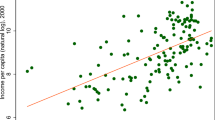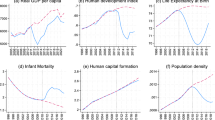Abstract
The central claim of this essay is that gender is a key term for understanding economic development insofar as it reveals fundamental aspects in the organization of production and labor. Following a cursory review of influential approaches to development and their relationship to the parallel theorization of gender, I compare two recent modalities of industrial restructuring: the expansion of export-processing plants (maquiladoras) along the U.S.-Mexico border and the survival strategies of electronics firms in Southern California. My theoretical focus is on the specification of gender as a process that allows for the maintenance of a substratum of labor, predominantly female, outside of market exchanges. That labor is recurrently tapped by employers seeking competitive edges in domestic and international markets. The same mechanism enables the replication of patterns of unequal exchange through the articulation of two interdependent models of production — one domestic and one market oriented — by which capitalist accumulation is fulfilled.
Similar content being viewed by others
References
Balassa, Bela 1981 The Newly Industrializing Countries in the World Economy. New York: Pergamon.
Bell, Daniel 1976 The Coming of Post-Industrial Society. New York: Basic.
Benería, Lourdes, ed. 1982 Women and Development: The Sexual Division of Labor in Rural Soceities. New York: Praeger.
Benería, Lourdes andGita Sen 1986 “Accumulation, reproduction, and women's role in economic development: Boserup revisited.” In Eleanor B. Leacock and Helen I. Safa (eds.), Women's Work: Development and the Division of Labor by Gender. South Hadley, MA: Bergin and Garvey.
Benería, Lourdes andKatharine Stimpson, eds. 1987 Women, Households, and the Economy. New Brunswick, NJ: Rutgers University Press.
Booth, David 1975 “Andre Gunder Frank: An introduction and appreciation.” In Ivar Oxaal, Tony Barnett, and David Booth (eds.), Beyond the Sociology of Development. London: Routledge and Kegan Paul.
Boserup, Ester 1970 Woman's Role in Economic Development. New York: St. Martin's.
Bradby, Barbara 1977 “The non-valorisation of women's labour.” Critique of Anthropology 3:131–138.
Cardoso, Fernando H., andEnzo Faletto 1969 Dependencia y Desarrollo en América Latina. Mexico, D.F.: Siglo Veintiuno.
Chase-Dunn, Christopher 1989 Global Formation: Structures of the World-Economy. New York: Basil Blackwell.
Chodorow, Nancy andSusan Contratto 1982 “The fantasy of the perfect mother.” In Barrie Thorne and Marilyn Yalom (eds.), Rethinking the Family: Some Feminist Questions. New York: Longman.
Deere, Carmen Diana andMagdalena León de Leal 1981 “Peasant production, proletarianization, and the sexual division of labor in the Andes.” Signs 7:338–360.
ECLA (United Nations Economic Commission for Latin America) 1969 Development Problems in Latin America. Austin: University of Texas.
Edholm, Felicity 1977 “Conceptualising women.” Critique of Anthropology 3:101–130.
Engels, Frederick 1972 The Origin of the Family, Private Property, and the State (1884). New York: International Publishers.
Evans, Peter B., Dietrich Rueschemeyer, andTheda Skocpol, eds. 1985 Bringing the State Back In. New York: Cambridge University.
1983 For We Are Sold, I and My People: Women and Industry in Mexico's Frontier. Albany: State University of New York.
1987 “Technology and employment along the U.S.-Mexico border.” In Cathryn L. Thorup (ed.), The United States and Mexico: Face to Face With New Technology. New Brunswick, NJ: Transaction.
1988 “Invisible amidst the glitter: Hispanic women in the southern California electronics industry.” In Anne Statham, Eleanor M. Miller, and Hans O. Mauksch (eds.), The Worth of Women's Work: A Qualitative Synthesis. Albany: State University of New York.
1990 “Power surrendered, power restored: The politics of home and work among Hispanic women in southern Florida.” In Louise Tilly and Patricia Guerin (eds.), Women, Politics, and Change. New York: The Russell Sage Foundation.
Frobel, Folker, Jurgen Heinrichs, andOtto Kreye 1981 The New International Division of Labour. New York: Cambridge University.
Gunder Frank, Andre 1967 Capitalism and Underdevelopment in Latin America: Historical Studies of Chile and Brazil. New York: Monthly Review.
Hartmann, Heidi 1976 “Capitalism, partiarchy and job segregation by sex.” In M. Blaxall and B. Reagan (eds.), Women and the Workplace. Chicago: University of Chicago.
Hartmann, Heidi I. andAnn R. Markusen 1980 “Contemporary Marxist theory and practice: A feminist critique.” Review of Political Economics 12:87–94.
ILO (International Labour Organization) 1988 Economic and Social Effects of Multinational Enterprises in Export-Processing Zones. Geneva: ILO.
Inkeles, Alex 1969 “Making men modern: On the causes and consequences of individual change in six countries.” American Journal of Sociology 75:208–225.
Inkeles, Alex. andD. Smith 1974 Becoming Modern: Individual Change in Six Developing Countries. Cambridge, MA: Harvard University.
Jelin, Elizabeth 1977 “Migration and labor force participation of Latin American women: The domestic servants in the cities.” Signs 3:129–141.
Kessler-Harris, Alice 1975 “Stratifying by sex: Understanding the history of working women.” In Robert D. Edwards, Michael Reich, and David M. Gordon (eds.), Labor Market Segmentation. Lexington, MA: D. C. Heath.
Leacock, Eleanor andHelen I. Safa, eds. 1986 Women's Work: Development and the Division of Labor by Gender. South Hadley, MA: Bergin and Garvey.
Martin, Emily 1987 Woman in the Body. Boston, MA: Beacon Press.
Marx, Karl 1965 Capital, Vol. 1 (1867). Moscow: Progress.
Mies, Maria 1988 “The dynamics of the sexual division of labor and the integration of women into the world market.” In Lourdes Benería (ed.), Women and Development: The Sexual Division of Labor in Rural Societies. New York: Praeger.
Minge-Kalman, Wanda 1978 “A theory of the European household economy during the peasant to worker transition with an empirical test from a Swiss Alpine village.” Ethnology 2:560–572.
Minge-Klevana, Wanda 1980 “Historical changes in the family division of labor during industrialization in the west.” Paper prepared for Symposium no. 85. Wenner Gren Foundation for Anthropological Research, Burg Wartenstein, Austria.
Mintz, Sidney 1971 “Men, women and trade.” Comparative Studies in Society and History 133:247–269.
Molyneux, Maxine 1977 “Androcentricism in Marxist anthropology.” Critique of Anthropology 3:55–82.
Moser, Caroline 1978 “Informal sector or petty commodity production: Dualism or dependence in urban development?” World Development 6:1084
Nash, June 1975 “A critique of social science models of contemporary society: A feminine perspective.” Annals of the New York Academy of Sciences 260:84–100.
Nash, June andM. Patricia Fernández Kelly, eds. 1983 Women, Men, and the New International Division of Labor. Albany: State University of New York.
Nash, June andHelen I. Safa, eds. 1980 Sex and Class in Latin America: Women's Perspectives on Politics, Economics and the Third World. South Hadley, MA: Bergin and Garvey.
Oates, Joyce Carol 1989 American Appetites. New York: E. P. Dutton.
O'Brien, Philip J. 1975 “A critique of Latin American theories of dependency.” In Ivar Oxaal, Tony Barnett, and David Booth (eds.), Beyond the Sociology of Development. London: Routledge and Kegan Paul.
Peattie, Lisa Redfield 1981 Thinking About Development. New York: Plenum.
Portes, Alejandro andJohn Walton 1981 Labor, Class, and the International System. New York: Academic.
Prebisch, Raul 1950 The Economic Development of Latin America and Its Principal Problems. New York: United Nations.
Rapp, Rayna 1982 “Family and class in contemporary America: Notes toward the understanding of ideology.” In Barrie Thorne and Marilyn Yalom (eds.), Rethinking the Family: Some Feminist Questions. New York: Longman.
Reiter, Rayna R., ed. 1975 Toward an Anthropology of Women. New York: Monthly Review.
Rosaldo, Michelle Zimbalist andLouise Lamphere, eds. 1974 Woman, Culture and Society. Stanford, CA: Stanford University.
Roxborough, Ian 1986 Theories of Underdevelopment. London: Macmillan.
1975 “Engels revisited: Women and the organization of production and private property.” In Rayna R. Reiter (ed.), Toward an Anthropology of Women. New York: Monthly Review.
1983 “Kinship and class consciousness.” In H. Medick and D. Sabean (eds.), Family: Maternal Interest and Emotion.” Proceedings of the Roundtable on History and Anthropology. Cambridge: Cambridge University.
Safa, Helen I. 1980 “Class consciousness among working-class women in Latin America: Puerto Rico.” In June Nash and Helen I. Safa (eds.), Sex and Class in Latin America: Women's Perspectives on Politics, Economics and the Third World. South Hadley, MA: Bergin and Garvey.
Sanderson, Steven, ed. 1985 The Americas in the New International Division of Labor. New York: Holmes and Meier.
Sassen, Saskia 1988 The Mobility of Labor and Capital. New York: Cambridge University.
Scott, Joan W. 1986 “Gender: A useful category of historical analysis.” The American Historical Review 91:1053–1075.
Smith, Joan, Immanuel Wallerstein, andHans-Dieter Evers, eds. 1984 Households and the World-Economy. Beverly Hills, CA: Sage.
Thomas, George M., John W. Meyer, Francisco O. Ramirez, andJohn Boli 1987 Institutional Structure: Constituting State, Society, and the Individual. Beverly Hills, CA: Sage.
Tilly, Louise A. andJoan W. Scott 1987 Women, Work and Family. New York: Methuen.
Wallerstein, Immanuel 1974 The Modern World-System I: Capitalist Agriculture and the Origins of the European World Economy. New York: Academic.
Ward, Kathryn 1987 Women and the Global Economy. Urbana: University of Illinois.
Wood, Charles 1987 “Demographic perspectives on agrarian change and the transformation of rural life in Brazil.” Paper presented at the annual meeting of the American Sociological Association, Chicago, August 17–21.
Wright, Erik Olin 1985 Classes. London: Verso.
Young, Kate 1982 “The creation of a relative surplus population: A case study from Mexico.” In Lourdes Beneria (eds.), Women and Development: The Sexual Division of Labor in Rural Societies. New York: Praeger.
Zaretsky, Eli 1982 “The place of the family in the origins of the welfare state.” In Barrie Thorne and Marilyn Yalom (eds.), Rethinking the Family: Some Feminist Questions. New York: Longman.
Author information
Authors and Affiliations
Rights and permissions
About this article
Cite this article
Fernández Kelly, M.P. Broadening the scope: Gender and international economic development. Sociol Forum 4, 611–635 (1989). https://doi.org/10.1007/BF01115066
Issue Date:
DOI: https://doi.org/10.1007/BF01115066




